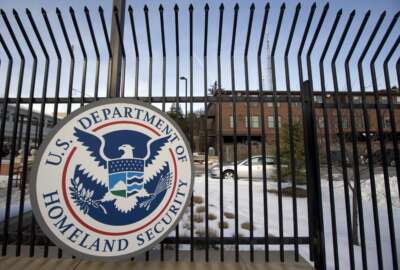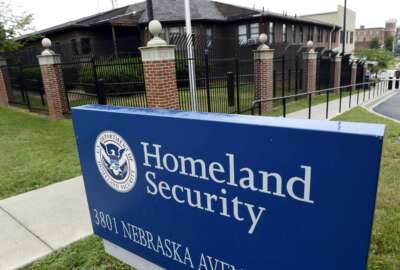 First Look
First Look Nominee for DHS intel office pledges to take on longstanding morale issues
The DHS Office of Intelligence and Analysis has consistently ranked as among one of the worst places to work in the federal government.
Best listening experience is on Chrome, Firefox or Safari. Subscribe to Federal Drive’s daily audio interviews on Apple Podcasts or PodcastOne.
A former Bush administration official tapped by President Biden to lead the Department of Homeland Security’s intelligence branch is pledging to take on low employee morale and other management issues at the division.
Kenneth Wainstein, nominee to be under secretary of homeland security for intelligence and analysis, said improving morale will be one of his top priorities if confirmed to lead the DHS Office of Intelligence and Analysis.
“A fundamental issue and challenge for me, if I walk into I&A, is to assess what the morale of the workforce is, and take every measure I can to improve that morale, which improves the effectiveness of the organization,” Wainstein said Wednesday during his confirmation hearing before the Senate Select Committee on Intelligence.
A former federal prosecutor, Wainstein also served as general counsel and then chief of staff at the FBI during the Bush administration. He also established and led the National Security Division at the Justice Department, and in 2008, served as President Bush’s homeland security advisor. Most recently, Wainstein was a litigation partner in the Washington, D.C. office of Davis Polk & Wardwell.
“I’ve stepped into management positions in a number of different entities throughout my government career,” Wainstein said. “Morale can change, it can turn on a dime. But it also can improve on a dime. And it’s a matter of doing some blocking and tackling of management, making sure that people have career paths laid out, opportunities for details, training, that kind of thing.”
The Office of Intelligence and Analysis supports intelligence activities across DHS. It’s also the only Intelligence Community entity “statutorily charged with delivering intelligence to our state, local, tribal, territorial, and private-sector partners, and developing intelligence from those partners for the department and the IC,” according to the Office of the Director of National Intelligence.
But the office has come into outside criticism recently for failing to raise warnings about the Jan. 6 riot at the Capitol, and for collecting information on journalists covering the Black Lives Matter protests in Portland, Oregon, in 2020.
An internal report on the division’s activities in Portland criticized those actions and recommended DHS conduct a “holistic review of the strategic direction of I&A.”
Even before Portland, however, the office has consistently polled at the bottom of the Partnership for Public Service’s “Best Places to Work In The Federal Government” rankings.
In 2020, the office’s employee “engagement score” ranked 397 out of 411 subcomponent agencies across government. The only DHS subcomponent that ranked lower was the Countering Weapons of Mass Destruction Office.
In responses to written questions, Wainstein told the committee he would focus on recruiting a diverse workforce and retaining people through “the development of additional career paths,” as well as “work-life balance policies with flexible work scheduling and a robust and effective hybrid telework program.”
“I&A should focus on developing in-depth entry-level training starting at the onboarding stage,” Wainstein wrote. “Rotational assignments across DHS and the IC can broaden and deepen the experiences of the workforce. Finally, I&A must focus on identifying and nurturing high performers throughout the organization to develop a cadre of I&A employees prepared for formal leadership roles.”
The office is also poised to play a big role in the Biden administration’s strategy for countering domestic terrorism.
“I&A plays a critical role in tying the federal government’s responsibilities and efforts against domestic terrorism with the state, local, tribal, territorial and private sector,” Wainstein said during the hearing. “And that’s a really important piece and real huge value add that I&A brings to the domestic terrorism fight, and frankly, to the whole intelligence enterprise.”
Despite that pivotal role, the office has faced questions about how it stacks up against other IC agencies. In response to written answers, Wainstein said he would “assess whether I&A’s analytic production is sufficiently positioned to meet the most significant needs of I&A’s partners and customers.”
“I will do that by assessing whether I&A’s analytic production aligns with its analytic goals, the IC’s priorities and standards of analytical tradecraft,” he added.
In endorsing Wainstein’s nomination at the end of the hearing, SSCI Chairman Mark Warner (D-Va.) also previewed the challenges ahead for the office.
“I think you have absolutely the right experience at this moment in time for a part of the IC and law enforcement [where] I kind of understand its role, but candidly, still don’t fully understand,” Warner said.
Copyright © 2025 Federal News Network. All rights reserved. This website is not intended for users located within the European Economic Area.
Follow @jdoubledayWFED
Related Stories





